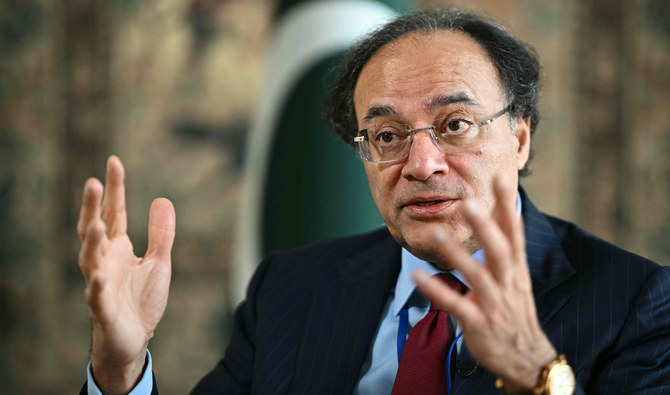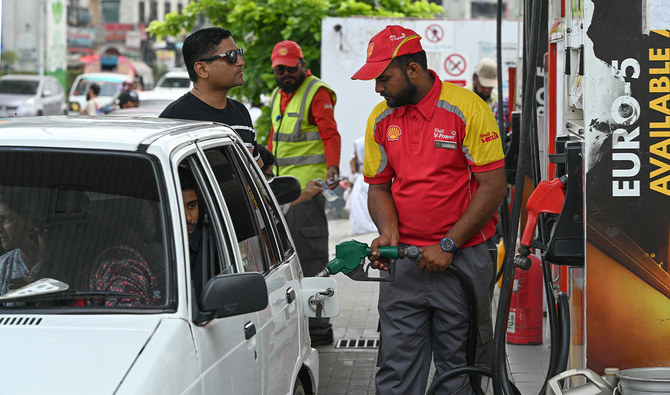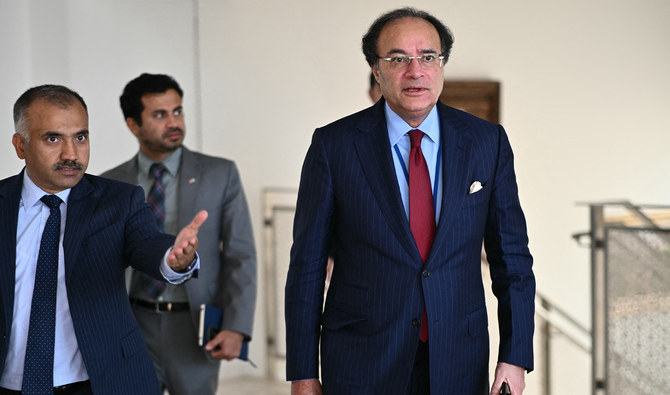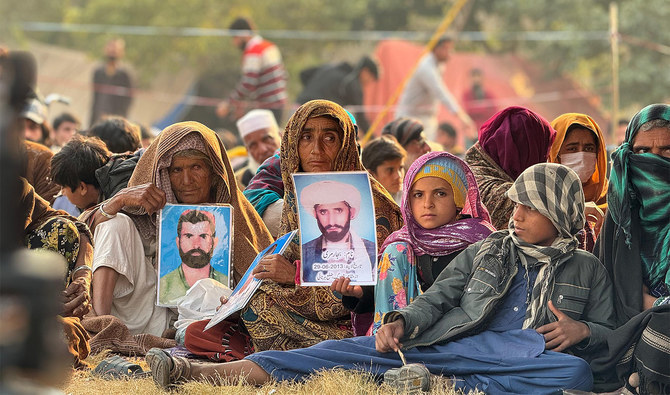ISLAMABAD: Security concerns stopped foreign cricketers from touring Pakistan four years ago when the country’s premier domestic Twenty20 tournament was launched, forcing organizers to stage the event on neutral turf in the United Arab Emirates.
When the 2020 edition of the Pakistan Super League starts in Karachi on Thursday, Darren Sammy of the West Indies and Shane Watson of Australia will be among 36 foreign cricketers involved in the six franchises.
“The foreign players coming is a huge bonus for us,” Pakistan Cricket Board chief executive Wasim Khan told the Associated Press. “It’s a massive step forward because they (foreign players) clearly believe that it’s safe to be here for 4-5 weeks.”
The return of international cricket has been a slow process in Pakistan following a terrorist attack on the Sri Lanka team’s bus in Lahore during a test series in 2009.
For this T20 event, the PCB has worked with the Federation of International Cricketers Association and also shared its security plans with foreign stars to make them feel safe in Pakistan.
“We firmly believe now that we are in a good position,” Wasim said. “We’re delighted there are so many players coming here and it’s a great endorsement for us as a country.”
Pakistan cricket went into isolation for more than six years after the attack near Qaddafi Stadium in Lahore in 2009.
There was a ray of hope in 2015 when Zimbabwe toured for limited-overs series but it wasn’t enough for Pakistan to host its first PSL tournament the following year, forcing organizers to stage it in the UAE.
In 2017, the PSL final was played at a packed Qaddafi Stadium, in stark contrast to the group-stage matches that were contested in mostly empty venues in the UAE.
Over the next two years, a World XI, Sri Lanka, and the West Indies also played limited-overs matches in Pakistan, and more PSL games were staged in Lahore and Karachi.
The PCB overcame another barrier when it hosted test matches last year in Pakistan for the first time in a decade. Pakistan successfully hosted two tests against Sri Lanka in December and, after a lot of negotiations, last month managed to convince Bangladesh to play a test in Rawalpindi.
All the ‘cricket comes home’ activities, of course, require heavy security surrounding the foreign teams, with the kind of armed security and road closures usually reserved for visiting heads of state. Visiting players have had virtually no movement outside the team hotels or match venues — although a few Sri Lanka players went to a shopping mall while they stayed in the federal capital.
But Wasim believes that over time, the blanket security can be eased and players will feel more relaxed.
“Certainly it’s something that we are looking at,” he said. “The more we play at home, the more confidence people have, the better it will become. We certainly can’t sustain state-level security.”
More freedom of movement for visiting players and ensuring costs for security don’t overburden federal and local governments has to be balanced, Wasim said, with “making sure we never become complacent and we provide the right level of security.”
In a bid to reassure cricket officials from countries such as Australia, England, New Zealand and South Africa about the security situation, Pakistan invited the Marylebone Cricket Club — the guardians of the laws of cricket — for limited-overs matches in Lahore.
Led by ex-Sri Lanka captain Kumar Sangakkara, who is also MCC president, the players have had VIP-level security, which is a slightly lower level than that provided to Bangladesh and Sri Lanka squads for recent series.
“MCC has played golf ... so we’ve given them the level of freedom which under VIP status you can afford. Certainly, that’s something that we wish to move forward as well,” Wasim said.
Sangakkara has also backed Pakistan’s efforts to resume international cricket in Pakistan.
“Security is always a major concern everywhere is the world,” Sangakkara said. “In Pakistan I think the steps that have been taken over the past few years have instilled great amounts of confidence in the cricketing nations beyond the shores of Pakistan and slowly but surely that confidence is building up.
“The more times international sides tour that message becomes stronger and becomes harder to ignore.”
And Wasim believes the need for Pakistan to ‘host’ international cricket series in neutral countries is closer to ending.
“There’s no reason for us to play anywhere else now,” Wasim said. “Cricket has firmly resumed within the country and we fully expect this to be the way moving forward.”
Going back: Upswing in foreigners for Pakistan’s T20 league
https://arab.news/z3862
Going back: Upswing in foreigners for Pakistan’s T20 league

- Security concerns stopped foreign cricketers from touring Pakistan four years ago
- Pakistan Cricket Board says foreign players coming to Pakistan is a ‘huge bonus’
Pakistan, Saudi Arabia and Uzbekistan ink ‘landmark’ agreement to promote trade, investment

- As per agreement, Uzbekistan’s largest bank and a Pakistani firm will support investors in all three countries
- Partnership to attract foreign investment particularly in key sectors of energy, infrastructure and agriculture
ISLAMABAD: Pakistan, Saudi Arabia and Uzbekistan have signed a “landmark” partnership agreement to boost economic cooperation and create new opportunities for investors in the region, Pakistan’s state-run television reported on Tuesday.
As per the terms of the agreement, Uzbekistan’s largest bank Ansher Capital will work closely with KASB Securities Limited (KASB), a leading Pakistani stock and commodity brokerage firm, to provide financial advisory and corporate finance services to investors in all three countries, the state media said.
Both firms will support investors and traders in Pakistan, Uzbekistan and Saudi Arabia by providing expert guidance on navigating financial markets, the Pakistan Television (PTV) said.
“In a significant development, Uzbekistan, Pakistan, and Saudi Arabia have signed a landmark partnership agreement aimed at promoting investment and trade between the three countries,” PTV said.
“The partnership is expected to expand the market and attract foreign investment, particularly in key sectors such as energy, infrastructure, and agriculture.”
The report said that the agreement is also expected to strengthen trade ties between the three countries, with a focus on increasing trade volumes and promoting economic integration.
“The partnership will enable businesses to tap into new markets and access new investment opportunities, creating jobs and driving economic growth,” PTV said.
Pakistan and Saudi Arabia enjoy strong trade, defense and cultural ties. The Kingdom is home to over 2.7 million Pakistani expatriates and serves as the top destination for remittances to the cash-strapped South Asian country.
Saudi Foreign Minister Prince Faisal bin Farhan arrived in Pakistan last week for a two-day visit aimed at strengthening bilateral economic cooperation and pushing forward previously agreed investment deals. Pakistan has said it pitched investment projects worth $30 billion to Riyadh during Prince Faisal’s visit.
Islamabad has sought trade and economic partnerships with bilateral partners and allies as it seeks to navigate a macroeconomic crisis that has seen its reserves plummet to historic lows and its currency weaken significantly.
Pakistan’s finance minister says new IMF loan agreement targeted for early July

- The quantum and duration of new loan is still not clear, though the government wants at least a three-year program
- Muhammad Aurangzeb says the modalities of the new loan will be thrashed out with an IMF delegation next month
ISLAMABAD: Pakistan’s finance minister Muhammad Aurangzeb said on Tuesday the country planned to discuss the contours of a new loan program with an International Monetary Fund (IMF) delegation next month while hoping to reach a staff-level agreement with the global lender by early July.
Pakistan secured a $3 billion IMF bailout last year to avert a sovereign default and hopes to receive the final tranche later this month. However, the government wants a fresh IMF loan since the country continues to face tough economic challenges and plans to implement structural reforms.
“We are still hoping that we can get into a staff-level agreement by the time June is done or early July so that we can move on,” the finance minister said while addressing a news conference.
He informed he had good discussions with IMF and World Bank officials during the spring meetings held by both international lending organizations in Washington.
Aurangzeb maintained it was not right to say that the IMF was imposing strict conditions on Pakistan since the country needed to carry out reforms on its own to strengthen its economy.
“This is Pakistan’s program which is helped, supported, assisted by the fund,” he said. “This is how we have to see it since this is the way ownership will come.”
He maintained the country’s foreign reserves were increasing and would reach about $10 billion by the end of June this year well before the new IMF program.
“Once the final tranche comes from the IMF, end of this week, we will be over $9 billion,” he told the media. “By the time we end June, we will be anywhere between $9-10 billion, which is going to be equivalent to two months of import cover.”
The finance minister noted the country had made progress since its foreign reserves dipped to nearly $3.4 billion last year.
He said the stock market was also hitting all-time highs and foreign buyers were entering the market.
“The gross domestic product growth is expected to be at 2.6 percent in the current fiscal year,” he said, adding the government was taking steps to attract foreign investment and keep the current account and fiscal deficits within reasonable limits.
“The current account deficit has been reduced to $1 billion after a 74 percent reduction in FY24,” the minister said, adding the inflation was expected to remain at 24 percent during the ongoing fiscal year, while the trade deficit had been reduced to $17 billion following a 24.9 percent decrease.
He said the quantum and duration of the new IMF program was yet not clear, though the government wanted to secure at least a three-year loan package.
Pakistan and IMF have said they are already in discussions for the new loan.
Aurangzeb said structural reforms carried out by the government include increasing the government’s tax revenue-to-GDP ratio to 13 percent to 14 percent in next two or three years from the current level of around 9 percent, reducing losses of state-owned enterprises through their privatization, and better management of the debt-laden energy sector.
With input from Reuters
Pakistan refiners warn $6 bln upgrades at risk due to fuel price deregulation plan

- Regulatory authority proposes oil marketers, refineries be allowed to set prices instead of government
- Refiners demand they be consulted before the implementation of “irrational recommendations”
KARACHI: Pakistan’s plans to deregulate fuel prices could lead refiners to halt planned upgrades worth up to $6 billion and force some refineries to close, some of the country’s top refiners said in a letter to the country’s oil regulator.
Looking to drive down prices for consumers, the South Asian nation’s Oil & Gas Regulatory Authority (OGRA) has proposed that oil marketers and refineries be allowed to set fuel prices, instead of the government setting prices.
As part of the change, OGRA proposed scrapping or reviewing a rule that requires fuel buyers to purchase supply from local refineries, another issue the refiners said could result in “disastrous consequences.”
The refiners — state-run Pakistan Refinery and private domestic refiners Pak Arab Refinery, Attock Refinery, Cinergyco, and National Refinery — said they were already struggling to operate near full capacity and asked that they be consulted before the implementation of “irrational recommendations.”
“The refining sector requires OGRA support through pragmatic and supportive measures, rather than suggesting ways that if implemented would result in their permanent closure,” the refiners told OGRA on Monday in a letter, which was reviewed by Reuters.
The deregulation was aimed at boosting competition and protecting the public interest, OGRA told Reuters in a statement on Tuesday, but did not respond to specific questions on the letter from the refiners. However, it said in an April 17 presentation reviewed by Reuters the potential impact of deregulation on refinery upgrades had to be assessed carefully, calling it a challenge.
“The refineries upgradation will bring in investment of $5 — 6 billion and not only result in cleaner environment friendly fuels but also result in savings of precious foreign exchange of the country,” the refiners wrote in the letter to OGRA.
Pakistan hopes to get new IMF loan by early July, says finance minister

- Pakistan’s current $3 billion financial arrangement with IMF expires in late April
- Islamabad is seeking “bigger,” long-term loan to ensure macroeconomic stability
Pakistan is hoping to reach a staff-level agreement with the International Monetary Fund by June or early July, its finance minister said on Tuesday.
The country’s current $3 billion arrangement with the fund runs out in late-April, which it secured last summer to avert a sovereign default.
Islamabad is seeking a long-term bigger loan to help bring permanence to macroeconomic stability as well as an umbrella under which the country can execute structural reforms.
“We are still hoping that we get a staff-level agreement by June or early July,” Finance Minister Muhammad Aurangzeb told a conference in Islamabad.
He returned from Washington last week after leading a team to attend the IMF and World Bank’s spring meetings. “We had very good discussions in Washington,” he said.
He said he did not know at this stage the volume and tenure of the longer program.
Pakistan ‘rarely’ punished officials for rights abuses in 2023— State Department report

- US State Department releases annual “Country Reports on Human Rights Practices” for the year 2023
- Report says Pakistan witnessed extrajudicial killings, torture and restrictions on media freedoms last year
ISLAMABAD: Pakistan’s government “rarely” took steps to identify and punish officials who may have been involved in rights abuses in 2023, a report released by the US State Department said on Tuesday, pointing out incidents of extrajudicial killings, torture, enforced disappearances, violence against journalists and restrictions on media freedom had taken place in the country last year.
US Department of State released its annual “Country Reports on Human Rights Practices” to highlight rights issues in several countries, including Pakistan. In the report, Washington identified that Pakistan last year witnessed arbitrary killings, extrajudicial killings, enforced disappearance, torture and “cases of cruel, inhuman, or degrading treatment or punishment by the government or its agents.”
“The government rarely took credible steps to identify and punish officials who may have committed human rights abuses,” the report said.
Cases of “enforced disappearances” of citizens have long plagued Pakistan, where militants have waged a war against the state for decades. Families say people picked up by security forces often disappear for years, and are sometimes found dead, with no official explanation. Pakistani security agencies deny involvement in such disappearances.
The report also pointed out that last year Pakistan had seen incidents of restrictions on freedom of expression and media freedom, violence against journalists, unjustified arrests, disappearances of journalists, censorship and criminal defamation laws.
Pakistan’s recent actions to restrict Internet and mobile services throughout the country, especially on days when elections are held, have invited criticism from rights organizations and Washington. The interior ministry last week confirmed it had banned social media platform X in February to protect national security, maintain public order, and preserve the country’s “integrity.”
The State Department report further pointed out that rights issues in Pakistan during 2023 included extensive gender-based violence, including domestic or intimate partner violence, sexual violence, early, child and forced marriages. It said Pakistan had also reported incidents of female genital mutilation and crimes involving violence or threats of violence targeting members of religious, racial and ethnic minorities.
The report added that violence, abuse and social and religious intolerance by militant organizations and other non-state actors, both local and foreign, contributed to a culture of lawlessness in the country.
“Terrorist and cross-border militant attacks against civilians, soldiers, and police caused hundreds of casualties,” the report noted, crediting Pakistan’s military, police and other law enforcement agencies for carrying out “significant campaigns” against militants last year.
The South Asian country has seen an uptick in violence, mainly suicide attacks, since November 2022 when a fragile truce between militants and the state broke down. Pakistan has since then carried out military operations against the Pakistani Taliban or the Tehreek-e-Taliban Pakistan (TTP) and a Baloch separatist militant organization, the Balochistan Liberation Army (BLA) in the country’s two western provinces that border Afghanistan.










